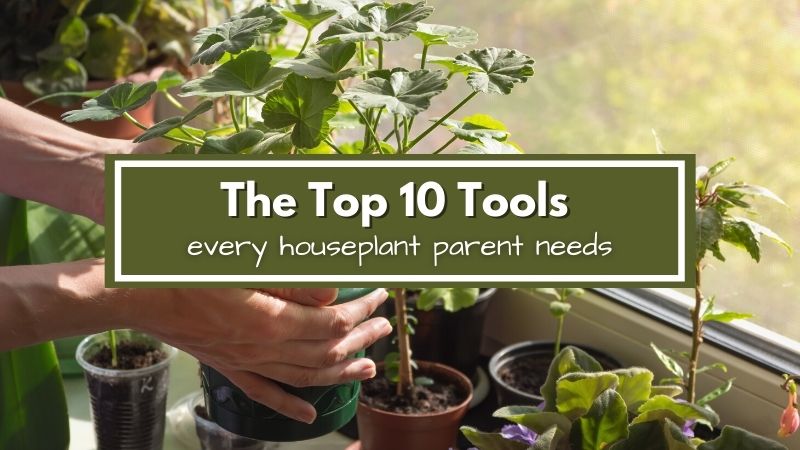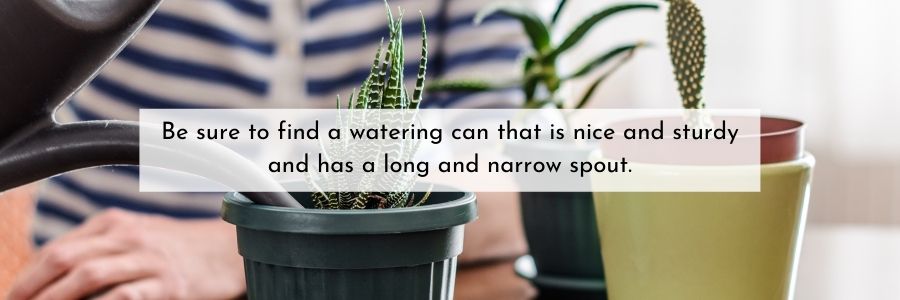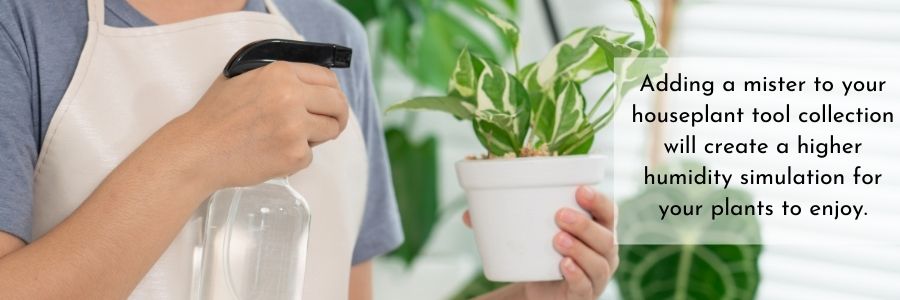
Top 10 Tools Every Houseplant Parent Needs
Being a houseplant owner is a rewarding and interactive addition to your home that adds a beautiful touch of greenery to an indoor environment. Taking care of houseplants at the core is the same as any garden plant; water, soil, lighting, etc.
However, there are a few tool swaps you will need to make when transitioning from taking care of a garden to houseplants. Over time there have been tools created for indoor plants that make it easier and more efficient for the caretaker.
We have put together a list of our top 10 favorite tools every houseplant parent needs for their indoor plants to stay happy and healthy for plenty of time to come.

Potting Tray
When repotting houseplants, more often than not, you don't have the luxury of getting your surroundings dirty as you do with outdoor plants. However, there are a variety of potting trays that will help you repot your plants while keeping your space mess-free! We offer two kinds of potting trays, a Leakproof Potting Tray and a Compact Size Potting Tray.
Both trays have a basin that allows you to set your plant and pot inside during the transplanting process. You will never have to worry about getting soil, fertilizer, or water all over your beautiful home. We recommend the Compact potting tray if you live in a small space like an apartment. You can store your potting tray with ease and pull it out to use whenever you please.

Watering Can
A watering can seems like an obvious addition to this list; however, choosing the right one is important to the health of your houseplants. Be sure to find a watering can that is nice and sturdy and has a long and narrow spout. Avoid large watering cans with sprinkler-like spouts. These watering cans are specifically for gardening and will not water your indoor plants properly.
Unlike garden plants that can receive water via sprinkler or rainfall, houseplants should receive water via their soil and roots. Having a watering can with a long and narrow neck allows you the freedom to control how much water your plant receives and will be able to reach down to the soil without getting their foliage wet.

Plant Mister
Similar to a watering can, plant misters are crucial for houseplant success. Many houseplants are native to tropical areas or prefer a certain level of humidity, which air-controlled indoor environments cannot provide. Adding a mister to your houseplant tool collection will create a higher humidity simulation for your plants to enjoy.
We recommend that you mist your houseplants first thing in the morning to ensure any water droplets will dry before any midday sun shines bright on their leaves. Misting your plants in the afternoon may result in scorched leaves because the sun will shine too bright on water droplets left on your plant's leaves.

Humidifier
Like we previously spoke about, humidity control is crucial in proper plant growth for houseplants. You can purchase any humidifier, small or large, and place it near your houseplants. Keeping a humidifier near your plants will help encourage extra humidity needed for their health and happiness.
If you use a humidifier with your houseplants, you can still mist their leaves in the morning because the humidifier emits such a fine mist in the air that their combination will not be too overwhelming for your plants. Humidifiers also help your plants transition from outdoors to indoors when the weather gets too cool for your plants to thrive outdoors.

Gloves
Having a good pair of gardening gloves is a crucial addition to your indoor gardening tool kit. Gloves serve many purposes like keeping your hands clean and free of fertilizers, pesticides, or other chemicals you may be dealing with, keeping you safe from any toxic plants, and other safety reasons. At Garden Goods Direct, we have Wonder Grip Gardening Gloves that can be used for indoor planting and outdoor gardening.

Hand Tools
Hand Trowel: A staple tool for many gardeners, this hand tool is nimble and used for digging, smoothing, applying, and moving soil in pottery. Their compact size allows you to scoop soil from one pot to another without the mess. Other larger gardening shovels or hand tools are bound to pick up too much soil or other amendments and be more of a hassle than help while caring for your houseplants.
Soil Scoop: Think of a hand scoop like the larger cousin of the hand trowel. These handheld tools are a bit larger but still small enough to be used for indoor gardening. Hand scoops are essential for large indoor plants because you can pick up large amounts of soil or potting mix from their bag to your plant's container. Because it is a scoop, it has raised sides that keep the soil in the tool and not all over your floors.
Soil Knife: A soil knife is a tool that will help you repot houseplants of all sizes. They come with serrated edges and sturdy blades that help loosen roots before you transplant from one container to another. We recommend that you slowly slide your soil knife around the perimeter of your pot to loosen the soil and roots before removing them from the pot. You can also use the soil knife for trimming off long or overgrown roots from their pots to replant them in a larger container.

Hand Pruners
Owning a pair of good ol' pruning sheers is crucial for your houseplant's health. Pruning plants allows them to grow healthy and happy by removing any dead or dying limbs, foliage, or diseased parts of your plant. Always remember to clean your pruners before and after pruning. Doing so will prevent unnecessary damage to your plants. Pruning your plant will help it grow fuller because it makes space for your plant to focus on new growth instead of repairing old and damaged growth.

Soil Probe
Soil probes for houseplants are not tools to confuse with gardening soil probes that take samples of soil conditions for outdoor plants. These probes are excellent tools that help you understand the condition of your potting soil and when your plant needs water.
You can monitor your plant's soil moisture from the root zone level so your plant will never be overwatered or underwatered. Overwatering a houseplant can cause root rot disease because their roots will sit in standing water for too long. Underwatering can cause their leaves to wilt or drop, and ultimately both can kill a houseplant completely.

Light Meter
Finding the right lighting conditions for your houseplants can be difficult, depending on the layout of your home. However, light meters can help you determine the perfect location for your plants to thrive. There are physical light meters you can purchase, along with light meter apps you can download to your phone. However, light meter apps may not be as effective as the physical tool. Place your light meter up to the leaves and face the sensor towards the light source.
The meter will then calculate a range of light levels that your plant is currently receiving, and you will be able to move your plant according to what conditions it requires. You may have heard plant experts say it is important to rotate your houseplants, and a light meter will help you determine when and where you should move your plants throughout the day to ensure they receive enough sunlight.

Grow Lights
What happens if you live in a space that does not receive enough natural light for your houseplants to thrive? Sometimes you get stuck with a living environment that is not conducive for houseplant survival; however, grow lights will solve this problem.
Grow lights come in different shapes and sizes, from light bulbs to large light fixtures and anything in between. Grow lights are made to mimic sunlight and will give your houseplants the light they need to grow happy and healthy.
